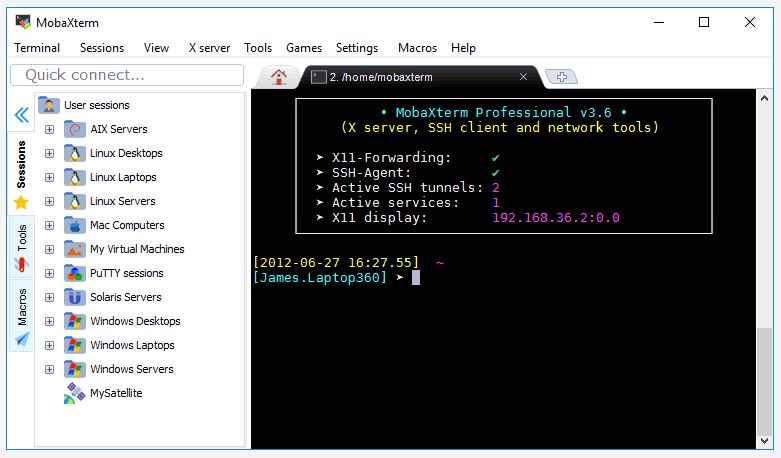

- Windows openssh how to#
- Windows openssh archive#
- Windows openssh password#
- Windows openssh download#
You will need to remove these by hand in a text editor.” Kind of confusing, but when both are executed I got the error for -d, but it didn’t change anything in the group file. However, the “OpenSSHreadme.txt” file in “OpenSSHdoc” states: “If you use both mkgroup commands, the group file will contain duplicates.
 Most instructions state to run both of the above commands. Returns if there is no PDC – primary domain controller Creates a group file for domain users. Creates a group file for local user accounts. Press Enter after each line don’t include quotes: In the following commands, -l indicates local and -d indicates domain. Enter the following in the command window. Any other unused port other than 5704 is also OK) Make sure to save the file For example, to change the port to 5704: #Port 22 change to: Port 5704 (note that “#” needs to be removed to change the port assignment. In the command window, cd to “OpenSSHetc” and enter “ edit sshd_config” to launch the command line editor to change the port assignment (this is at approx line 13 in the file – an external text editor such as notepad may also be used). If for some reason you need to use another port, you can change the port assignment for OpenSSH to prevent port conflicts. (Optional step) OpenSSH uses port 22 by default. If you are changing ports, go to the next step otherwise, skip to Step 4. In the command window, cd to the “OpenSSHbin” folder. On your computer, click Start–> Run–> Type in “cmd” (without quotes), and then hit the OK button. OpenSSH installation options Step2: Configure OpenSSH That’s it for the installation however, the SSH server’s passwd file must be configured next before using. Use the default settings as shown on the screen-shot below. Change the installation location to “C:OpenSSH” instead of program files to avoid spaces in directory names.
Most instructions state to run both of the above commands. Returns if there is no PDC – primary domain controller Creates a group file for domain users. Creates a group file for local user accounts. Press Enter after each line don’t include quotes: In the following commands, -l indicates local and -d indicates domain. Enter the following in the command window. Any other unused port other than 5704 is also OK) Make sure to save the file For example, to change the port to 5704: #Port 22 change to: Port 5704 (note that “#” needs to be removed to change the port assignment. In the command window, cd to “OpenSSHetc” and enter “ edit sshd_config” to launch the command line editor to change the port assignment (this is at approx line 13 in the file – an external text editor such as notepad may also be used). If for some reason you need to use another port, you can change the port assignment for OpenSSH to prevent port conflicts. (Optional step) OpenSSH uses port 22 by default. If you are changing ports, go to the next step otherwise, skip to Step 4. In the command window, cd to the “OpenSSHbin” folder. On your computer, click Start–> Run–> Type in “cmd” (without quotes), and then hit the OK button. OpenSSH installation options Step2: Configure OpenSSH That’s it for the installation however, the SSH server’s passwd file must be configured next before using. Use the default settings as shown on the screen-shot below. Change the installation location to “C:OpenSSH” instead of program files to avoid spaces in directory names. Windows openssh archive#
Unzip the archive and then run the installer setupssh.exe.
Windows openssh download#
Download OpenSSH for Windows v3.8.1p1-1. Windows openssh password#
For this guide, the SSH server is setup for password authentication. The Windows version of OpenSSH hasn’t been updated for sometime, so the latest pre-compiled version available for Windows is v3.8.1p1-1 (July 2004), which still works well. The OpenSSH suite consists of the SSH program, SCP, SFTP and several supporting utilities (see ). This allows for a quicker and smaller installation than if OpenSSH is installed as part of a regular Cygwin installation. This guide uses the free and precomplied version of the OpenSSH suite, a stand alone version of SSH using a stripped down version of Gygwin.
TCP/IP and X11 connection tunneling (a slightly more complex topic not explained in this guide). Use applications such as Filezilla or WinSCP for file management operations on the same computer or from a remote computer. Remotely connect computers (running Windows or Linux) and execute commands. Enhanced Security – user and host authentication, data encryption and integrity. Typically used on Linux and UNIX systems, SSH runs on Windows systems using Linux-like environments such as Cygwin. It supports tunneling, port forwarding and transferring files with the associated protocols SFTP (Secure File Transfer Protocol) and SCP (Secure Copy Protocol), which are part of the standard SSH package. Connections are made using public-key cryptography or password authentication, while the data itself is encrypted using one of several included encryption algorithms. SSH encrypts all of the data, including the authentication data, allowing secure communications over unsecured networks, such as the Internet. It’s used to log into and execute commands between remote computers or devices and is widely used as a secure replacement for the insecure telnet and rlogin protocols. SSH (Secure Shell) is a secure communications networking protocol based on the client-server model. Windows openssh how to#
This guide explains how to install and configure a SSH server for a Windows XP home computer.






 0 kommentar(er)
0 kommentar(er)
